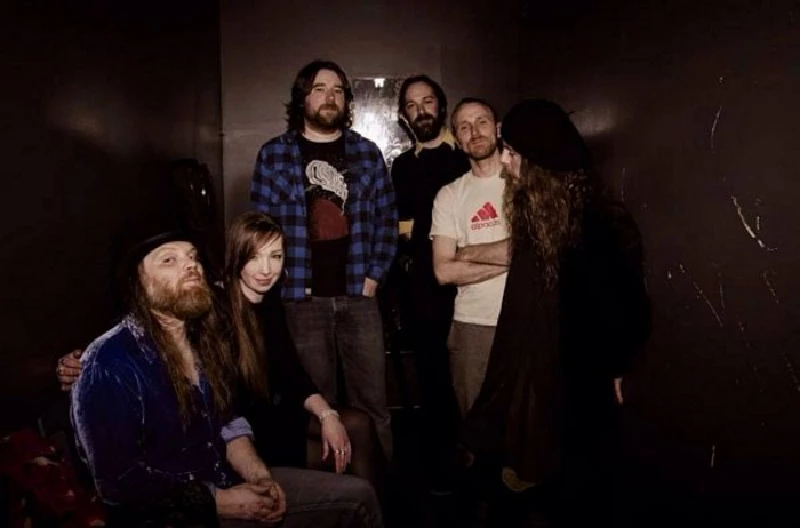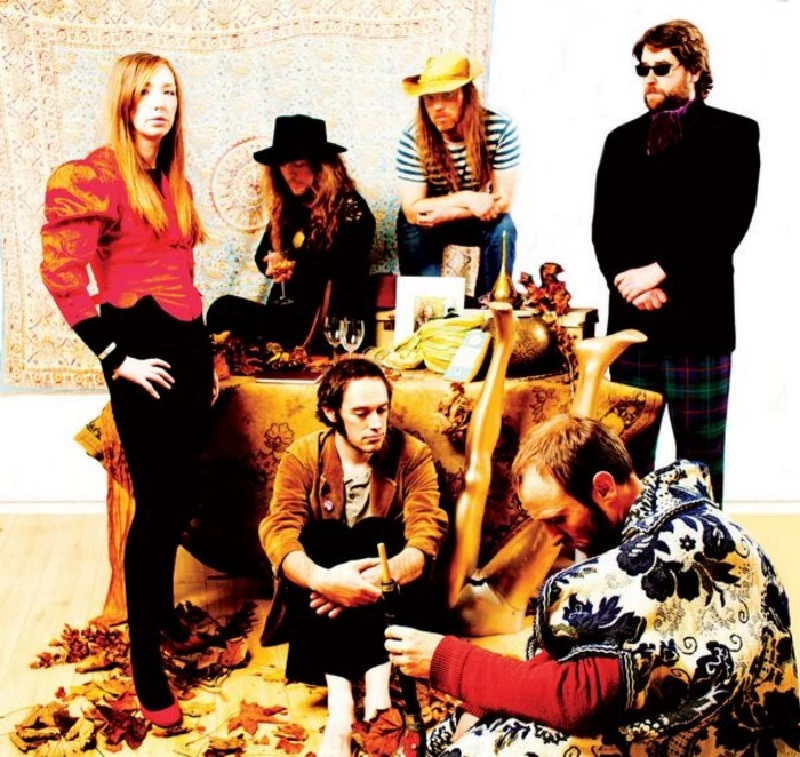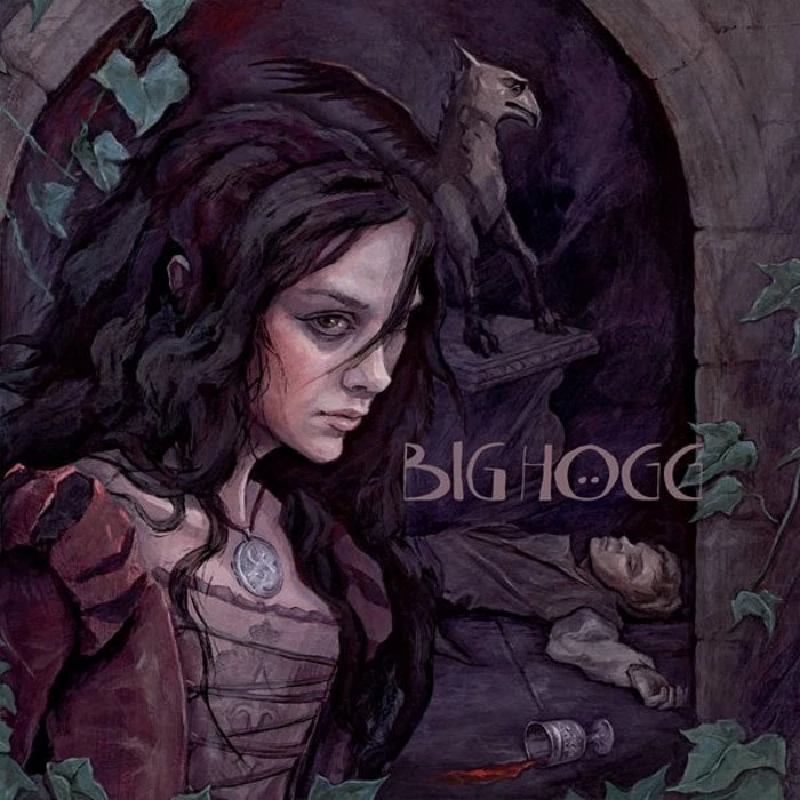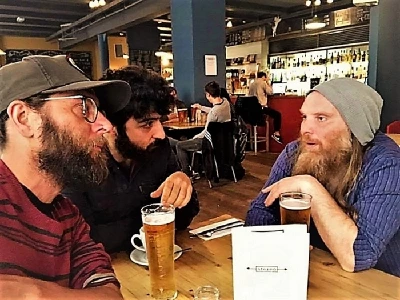Big Hogg - Interview
by John Clarkson
published: 24 / 12 / 2015

intro
John Clarkson speaks to Justin Lumsden, the vocalist and guitarist with brass-infused Glaswegian sextet Big Hogg, whose music has elements of classic rock, folk, progressive rock and psychedelia, about his band's self-titled debut album
Big Hogg are a brass-infused sextet from Glasgow, whose music contains elements of classic rock, folk, progressive rock and psychedelia. The band, which includes in its line-up Justin Lumsden (electric and acoustic guitars, vocals), Sophie Sexon (flute, vocals), Richard Merchant (trumpet, tenor horn and cornet), Ross McCrae (trombone), Alasdair C. Mitchell (bass guitar) and Nigh Gaughan (drums, percussion), played two Pennyblackmusic Bands’ Nights in Glasgow and Edinburgh supporting the Willard Grant Conspiracy in September, and are a growing presence on the Scottish music scene. They have appeared at the Wickerman and Rockaway Beach festivals, and released their eponymous debut album on Glasgow-based label Neon Tetra to critical acclaim in August. Band leader and main songwriter Justin Lumsden spoke to Pennyblackmusic about Big Hogg. PB: You started out apparently by "sinking your teeth in Aberdeen's overlooked fusion scene." What was that and how long have you lived in Glasgow? Why did you decide to move there from Aberdeen? JL: Hah! Perhaps not a "fusion" scene as such. I worked as a gigging guitarist for about five years in the nineties - jazz, funk and soul, blues, psych, Latin American ... you name it. I played it. Earned a fair crust too! I moved to Edinburgh in 2000 but the scene there seemed to be predominantly folk and jazz so I upped sticks again and moved to Glasgow in 2001. More and more gigs I wanted to see were happening there so it was a no brainer really. PB: Big Hogg's music is really diverse. You can hear elements in your sound of the Sensational Alex Harvey Band, Jethro Tull, Little Feat, the Allman Brothers, the Canterbury Folk sound and the Soft Machine, early Pink Floyd and Captain Beefheart. What can be found in your record collection? JL: Not a great deal of music recorded after 1976! About 600 titles but recently I've been spinning Leon Russell, 10cc, Alice Coltrane, Trader Horne, Pete Brown and Piblokto, Mighty Baby, Can, Chris McGregor's Brotherhood of Breath, Fela Kuti, Banchee and Wes Montgomery to name a few. All the artists mentioned in the question are in there too. PB: While at one level Big Hogg's music is very late 60's/early 70's influenced, it is very much a 21st century take on that era and you bring something really fresh to it with the involvement of your two brass players Ross McCrae and Richard Merchant. Do you think that is a fair interpretation of your music? JL: More than fair. I remember having a conversation with Rich (we shared a flat with Ross a few years back) about the difficulty of writing and performing American-influenced music in the modern era. We concluded that the true 'soul' of British music could be found in Yorkshire brass band arrangements - all the feeling of blues and jazz was in there but with an added poignancy. Also the Kinks made wonderfully British sounding rock and roll records - marry that to Soft Machine and Dr John and you have the basic ingredients for Big Hogg. PB: As there are six of you and some of you such as Sophie Sexon and yourself are involved in other projects, does that make organising gigs and rehearsals difficult? Everything is generally planned months in advance but it can be tricky - rehearsals with all six are few and far between and we have a number of deps for the band. Fortunately we're all old friends, so there's no issue with people missing out. The pool of musicians in Glasgow is both deep and rich at the moment, so there's always somebody amazing to step in. PB: You have sole writing credit for five of the songs on ‘Big Hogg’, but the others are largely co-credits with yourself and various other members of the band. How does the songwriting in the band work? JL: At the start I provided all the music, lyrics and arrangements other than 'The Executioner' which I arranged from a demo Sophie gave me. I had a prolific period of writing and recording demos - there' are a stack of CDRs with probably 100+ songs and ideas in various states of completion. As we played together more and more certain ideas and motifs established themselves that were the product of joint contribution. I would write a new end section for a song and ask Ross or Rich for a brass melody. Sophie has written a fair share of lyrics - she has to sing most of the songs after all! PB: Your lyrics are often darkly surreal. We are introduced to ‘Lucky and Bobby’ “lying in a ditch with a bullet in their hearts” and on ‘Remember Handsome Tony?’ there are the lyrics “we took him from his Mummy/Now he has got nothing at all.” What are those songs about? JL: 'Lucky and Bobby' is about the darker end of some of my experiences living in Aberdeen. A few a of my friends became addicted to heroin. Upper middle class junkies basically. ' Remember Handsome Tony' deals more specifically with a period of isolation I experienced in 2006/7. I was drinking heavily but had ceased to be a happy drunk. I was in my early thirties and sensed the darkness closing in on a career that hadn't amounted to much. I countered this by writing music and songs as if my life depended on it which was how it seemed at the time! PB: The final track on ‘Big Hogg’ is a lullaby, ‘For R.W.’ Who is R.W.? JL: Robert Wyatt. I didn't have him in mind at the start – I recorded that one in my flat on Garrioch drive one morning. Just sort of came tumbling out - funny what happens sometimes when you wake up, smoke a blunt and press record. Afterwards it all made sense. I'm not one to put people up on pedastals ls but Robert Wyatt is a genuine legend. PB: You recorded the bulk of the album in an “intense” three days in Strathaven in South Lanarkshire cbefore adding overdubs later and then mixing it. Why did you decide to go there to record it? JL: Recording is an intense process! I had met a wonderfully talented sound engineer called Luigi Pasquini and together we plotted every last detail of the record. He suggested the Old Mill out in Strathaven. It differs from most studios in that it's a theatre with a control room downstairs - more of a sound stage with atmosphere , light and space than a gloomy box with a red light on. The budget for the record was pretty tight so we knew we'd have to hit the ground running. It's a lot easier to deal with pressure in a relaxed, idyllic rural environment. PB: The fantasy art painting cover on ‘Big Hogg’ is beautiful. Who is Julia Jeffrey who painted it and why did you choose that particular painting for the cover? JL: Julia is my partner and also a very talented artist - her originals and prints grace many a country house and you can find her book ‘Tarot of the Hidden Realm@ in most good bookshops. We conceived the cover art one sunny afternoon while having a few pints at a pub called Inn Deep which has tables outside next to the River Kelvin. Again every aspect was planned - the male and female figures represent the two 'protaganists' (oops, getting a bit prog concept here) and the gargoyle represents Perugia, Luigi's home town. I think Julia took two months to complete the painting. PB: You have achieved a lot in your few years together. What have for you been the personal highlights? When Alasdair and Nick joined the band I knew we had a rhythm section that could really deliver no matter what style of music was thrown at them so that was a real highlight for me. Recording the album was a great experience - from tracking at the Old Mill to mixing it on an ex BBC calrec desk the whole thing was just a joy. Several shows stand out - playing an improv set along to a performance of kinetic sculptures at Sharmanka , doing a show at the Barrowlands , festival slots at Wickerman and Rockaway Beach and the launch night at Stereo were all fantastic. Most of all having everyone round for dinner! I like to cook and through everything we've always met up once in a while for an evening of scran, records and riotous banter. PB: We have pulled you out of the studio where you have been mixing two albums. Who have they been for? JL: The first one was for a Glasgow band called Sloth Metropolis. They're sort of like a car crash involving Gentle Giant and Field Music with Sugarcane Harris playing electric violin. That album is a cracker. The other record is an album about Isobel Gowdie, who was a 17th century Scottish witch, which was written by an American artist called Gillian Chadwick. She flew over in April and we put a band around her consisting of myself, Alasdair and Stephen Douglas the drummer from The Trashcan Sinatras. Sophie, Rich and Ross played on a couple of tracks and there are contributions from Lavinia Blackwall and Mike Hastings from Trembling Bells too. That one's a collaboration between Gillian and Julia so there will be a lovely gatefold vinyl with an extensively illustrated booklet. Both of these are No Unicorn Productions, a company I have set up with Luigi. We have done six records this year. PB: What plans have Big Hogg for next year? JL: We hope to tour the UK and Europe and take our music to new audiences. There's a bunch of new material to work up so hopefully we'll record a new album in the spring. Onwards and upwards hopefully! PB: Thank you.
Band Links:-
https://www.facebook.com/bighoggbandPicture Gallery:-


soundcloud
most viewed articles
current edition
Carl Ewens - David Bowie 1964 to 1982 On Track: Every Album, Every SongArmory Show - Interview with Richard Jobson
John McKay - Interview
Colin Blunstone - Thalia Hall, Chicago, 16/7/2025
Bathers - Photoscapes 1
Billie Eilish - O2 Arena, London, 10/7/2025
Loft - Interview
Visor Fest - Valencia, Spain, 26/9/2025...27/9/2025
Sir Tim Rice - Interview
Robert Forster - Interview
previous editions
Manic Street Preachers - (Gig of a Lifetime) Millennium Stadium, Cardiff, December 1999Heavenly - P.U.N.K. Girl EP
Beautiful South - Ten Songs That Made Me Love...
Peter Perrett - In Dreams Begin Responsibilities Interview Part One
Boomtown Rats - Ten Songs That Made Me Love....
Oasis - Oasis, Earl's Court, London, 1995
Coldplay - Wembley Arena. London, 16/8/2022
Prolapse - Interview
Trudie Myerscough-Harris - Interview
Pixies - Ten Songs That Made Me Love...
most viewed reviews
current edition
Davey Woodward - Mumbo in the JumboSick Man of Europe - The Sick Man of Europe
Lucy Spraggan - Other Sides of the Moon
Amy Macdonald - Is This What You've Been Waiting For?
Suzanne Vega - Flying With Angels
Blueboy - 2
Bush - I Beat Loneliness
Phew, Erika Kobayashi,, Dieter Moebius - Radium Girls
Alice Cooper - The Revenge of Alice Cooper
Cynthia Erivo - I Forgive You
related articles |
|
Duke 72: Interview (2019 |

|
| John Clarkson speaks to Justin Lumsden, the main guitarist and songwriter in Glaswegian psychedelic/folk/rock sextet Big Hogg, about his new project Duke 72, with Melbourne-based drummer Jonny Mitchell, and their debut album, 'The Mid Shires Herald'. |
| Willard Grant Conspiracy/Big Hogg: Feature (2015) |
Pennyblackmusic Regular Contributors
Adrian Janes
Amanda J. Window
Andrew Twambley
Anthony Dhanendran
Benjamin Howarth
Cila Warncke
Daniel Cressey
Darren Aston
Dastardly
Dave Goodwin
Denzil Watson
Dominic B. Simpson
Eoghan Lyng
Fiona Hutchings
Harry Sherriff
Helen Tipping
Jamie Rowland
John Clarkson
Julie Cruickshank
Kimberly Bright
Lisa Torem
Maarten Schiethart